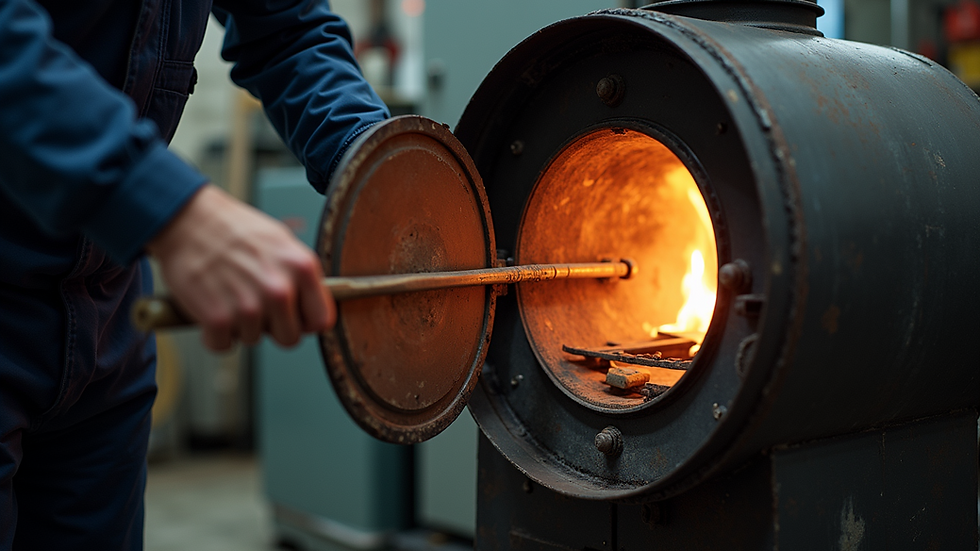The Importance of Regular Furnace Maintenance and Safety Inspections for Homeowners
- Asher Bennett
- Sep 25, 2025
- 4 min read
As the colder months approach, making sure your home stays warm and cozy becomes crucial. One of the key players in your heating system is the furnace. Regular maintenance and safety inspections are vital to ensure your furnace operates efficiently and safely. In this post, we'll discuss why homeowners should prioritize furnace maintenance and safety inspections.
Understanding the Importance of Furnace Maintenance
Furnace maintenance goes beyond just keeping your home warm. It is essential for the longevity and efficiency of your heating system. A well-maintained furnace can run up to 20% more efficiently, which translates to significant savings on energy bills over time. For instance, if your monthly heating bill is $200, proper maintenance could save you $40 each month, leading to nearly $160 in savings over the winter.
Regular maintenance helps identify potential issues before they turn into costly repairs. For example, a simple check of the ignition system can prevent a complete breakdown, which often happens during peak usage. Neglecting maintenance can lead not only to higher energy costs but also to larger, unexpected expenses later on.
Safety is another significant factor. For instance, carbon monoxide leaks can occur in poorly maintained furnaces. Regular inspections can help detect these dangerous issues early, allowing you to address them before they jeopardize your household’s safety.
Benefits of Safety Inspections
Safety inspections form a critical part of furnace maintenance. These inspections check for gas leaks, ensure proper ventilation and test carbon monoxide levels in your home. A report from the Centers for Disease Control and Prevention (CDC) highlights that about 400 people die every year in the U.S. from unintentional carbon monoxide poisoning. Regular inspections dramatically lower this risk.
Scheduling safety inspections provides peace of mind, especially for families with young children or elderly members. Knowing that your heating system is safe allows everyone to enjoy the warmth without worry. Additionally, many insurance policies require compliance with local building codes, which safety inspections ensure.

How Often Should You Schedule Maintenance?
It's generally recommended to have your furnace serviced once a year, ideally before the heating season kicks in. This timing allows for any necessary repairs before you start relying on your furnace for warmth.
If your furnace is older—say, over 15 years old—or has shown signs of trouble, you might need to schedule inspections more frequently. Keeping an ear out for unusual noises or detecting strange smells can signal that your furnace requires immediate attention.
What Does a Maintenance Check Involve?
A typical furnace maintenance check involves several key components:
Cleaning: Dust and debris can build up in your furnace, impacting efficiency. A technician will clean burners and heat exchangers to ensure optimal performance.
Filter Replacement: Clogged filters can restrict airflow and lead to decreased efficiency. Regularly changing or cleaning filters is crucial for both air quality and furnace performance.
Inspection of Components: Technicians will check crucial parts like the thermostat, ignition system, and ductwork to ensure everything functions correctly.
Safety Checks: This includes checking for gas leaks and testing carbon monoxide levels to ensure a safe environment in your home.
By investing in regular maintenance, homeowners can ensure their furnaces operate safely and efficiently throughout the winter months.
Cost-Effectiveness of Regular Maintenance
Some homeowners hesitate to spend money on maintenance, but it’s important to see it as an investment. Regular maintenance can lead to substantial long-term savings.
For example, families that skip maintenance may face emergency repairs that can cost over $500. In contrast, routine maintenance might only set you back about $100 to $200 annually. Moreover, a well-maintained furnace uses less energy, which can save you 15% to 20% on utility bills each month.
Additionally, many manufacturers require proof of regular maintenance to keep warranties valid. Missing these checks can leave you with bills for repairs that would otherwise be covered.
DIY vs. Professional Maintenance
While some homeowners may feel comfortable changing filters, more complex maintenance tasks should be left to professionals.
Certified technicians have the experience to spot potential issues that may not be apparent to you. They are equipped with the right tools to perform thorough inspections and repairs safely.
Taking on complicated maintenance tasks without the necessary knowledge could lead to further problems or safety hazards. Therefore, scheduling an experienced professional for maintenance is always the safest option.
Wrapping Up
Regular furnace maintenance and safety inspections are essential for homeowners aiming to keep their heating systems efficient and safe. By prioritizing these practices, you can enjoy a warm and inviting home while minimizing repair costs and safety risks. Contact us today to have is preform maintenance on your system.
Investing in regular maintenance not only extends your furnace's life but also brings peace of mind knowing that your home is both safe and efficient. As winter draws near, make it a priority to schedule your furnace maintenance and safety inspection. Your family will be grateful for it!




Comments